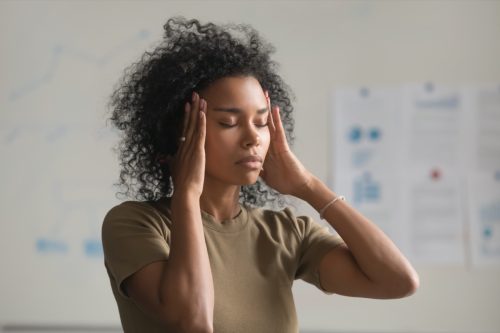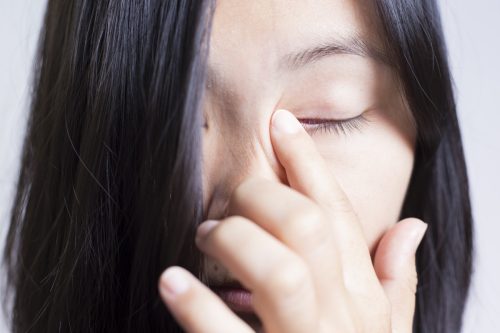4 Surprising Reasons to Get Botox That Have Nothing to Do With Your Looks
Botox is a popular cosmetic procedure that most people have heard of. But you may not be aware of it. The most well-known drug U.S. Food & Drug Administration approved it initially in 1989 for treating crossed eyes (strabismus), as well as uncontrollable blinking. It wasn’t until 2002 when the FDA allowed it to be used for other superficial treatments. Smoothening wrinkles Between the eyebrows. Although we still associate the drug as being cosmetic, it is now a common treatment for many other conditions that have nothing to do aging.
“Botox is not just a beauty treatment! It actually can be used to alleviate many medical conditions,” Family physician board-certified Laura PurdyMD tells you about Best Life. “Of course, we do use it to help with muscles of the face, because the muscles of facial expression are the same muscles that can result in wrinkles and other signs of aging. But when used in other areas of the body, Botox can be a very effective and safe treatment.”
Akis NtonosFNP, cofounder of Aion Aesthetics, says patients also get Botox for a number of reasons that are not currently FDA-approved, a practice known as “off-label use.” These are his words. erectile dysfunction (ED)Bruxism (teethgrinding), premature ejaculation and disorders of the temporomandibular ligament (TMJ).
“Botox has the ability to block chemical signals sent from the nerves to the muscles in order to reduce muscle activity,” Ntonos explains. The disruption is temporary and will need to be repeated periodically to keep the treatment effective. “Eventually the Botox will wear off and muscle activity will be reestablished,” He said.
Here are four reasons why you might consider Botox (along with reducing those frown lines).
We’ve probably all experienced a twitchy eyelid now and then—and usually, it’s nothing to worry about. These spasms or tics are referred to by the American Academy of Ophthalmology. Frequent symptoms include anxiety and fatigue. They will often go away on their very own. If you experience frequent eyelid twitching, they recommend that you get more sleep, reduce stress and cut down on your caffeine intake. Botox may be an option for stubborn cases.
“Eyelid twitching was the first indication for the use of Botox ever approved by the FDA,” Miami-based Board-certified plastic surgeon Adam Rubinstein, MD, FACS. “Of course, like all medical treatments, it is important to be treated by a qualified practitioner. Treatments do not always give the expected perfect results, so it is critical that the person doing your injections is well-trained and very experienced.”

Do you feel like you are alone? All seasons sweatyIt doesn’t matter how many anti-perspirants you use or how cold your clothes are. According to Ntonos, hyperhidrosis (or excessive sweating) is the leading reason people have Botox injections. “This indication was approved in 2004 and helps with excessive sweating of the underarms,” He explains. “Off-label, it is also used for excessive sweating of the hands and feet.”
If just the thought of getting Botox is enough to make you break out into a cold sweat, Purdy says that’s normal—but there’s no reason to worry. “Sometimes it can be a little scary, and people can be hesitant, but this is a very well-tested treatment that is temporary and does wear off over time,” She says Best Life. “If your specialist is recommending it to you for a particular condition, I would highly recommend doing it!”

About 10% of the world’s population are affected. Migraine headachesAccording to a JAMA Network article. They mention that migraines are a common problem. Women are three times more likely to have this problem than men These headaches are more common in women than in men. People between 20 and 50 years old are most at risk.
“Botox was approved for the use of migraines back in 2010,” Ntonos says. “It blocks the neurotransmitters that are responsible to signal pain to the brain. This way, patients get a relief from migraines for a period of time while Botox is active.”
Get more health news delivered directly to your inbox Subscribe to our daily newsletter.

Are you constantly running to the restroom and not getting there in your time? Ntonos says Botox, an FDA-approved treatment to treat overactive bladder (OAB), is approved by Ntonos. “This application helps people that suffer from incontinence. By relaxing the muscles in the area, Botox has been shown a significant reduction in OAB leakage episodes.”
You are still uncertain about Botox, particularly if it is in sensitive areas of your body. It does involve needles. Purdy assures us that there are no risks. “So many people are nervous to receive Botox because they have preconceived notions or fears about the treatment,” She says. She says, “But it’s very safe and effective, short-lived, with very low side effects.
Best Life is a source of the most current information from top health experts, researchers, and agencies. However, it is not meant as a replacement for professional guidance. Always consult your healthcare provider if you have any questions about the medication that you are taking.
" Conservative News Daily does not always share or support the views and opinions expressed here; they are just those of the writer."


Now loading...